Recently, Professor Antonio J. Plaza, Chairman of the IEEE Geoscience and Remote Sensing Society (IEEE GRSS) Paper Awards Committee sent a congratulatory message congratulating the paper [1] co-written by Professor Cheng Gong, Professor Han Junwei and others from the Brain and Artificial Intelligence Research Team of the School of Automation winning the IEEE GRSS Highest Impact Paper Award in 2023. This award is established by the IEEE Geoscience and Remote Sensing Society and is one of the most influential paper awards in the field of remote sensing. Northwestern Polytechnical University is the sole signatory of this paper.

The screenshot of the congratulatory message Professor Antonio J. Plaza, Chairman of the IEEE Geoscience and Remote Sensing Society (IEEE GRSS) Paper Awards Committee

Screenshot of award-winning paper [1]
This is the third time in the past three years that the research team has won a top international academic award. Paper [2] and Paper [3] written by this team respectively won the Most Influential Paper Award of the IEEE Geoscience and Remote Sensing Society in 2021 (the first award for independent work by a Chinese research institution), and the Best Paper Award of 2021 (the second award for independent work by a Chinese research institution in 30 years) from the top international journal in the multimedia field, IEEE TCSVT.
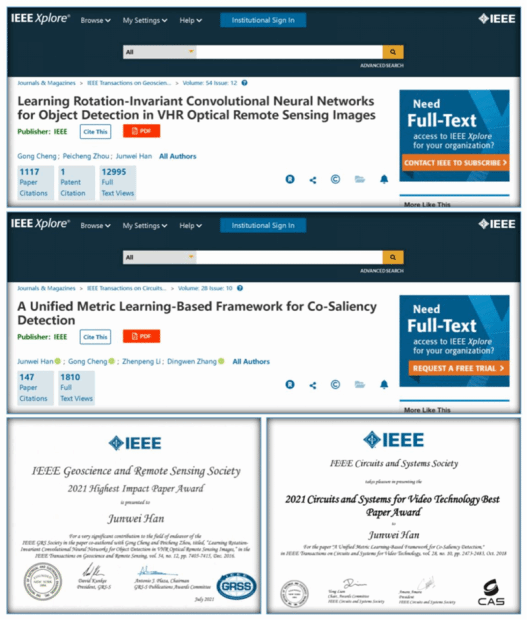
Screenshot of award-winning paper [2][3] and the certificates
The Brain and Artificial Intelligence Research Team of the School of Automation is a research team led by Professor Han Junwei from IEEE Fellow, and composed of young and middle-aged scholars such as national level talents and Ministry of Education's New Century Excellent Talents. Currently, there are 11 full-time teachers. The team has always adhered to the value orientation of “towering, standing, and nurturing”, targeting the international academic forefront of artificial intelligence, closely focusing on major national strategic needs, and continuously conducting basic theoretical research, key technological breakthroughs, and system integration verification in the fields of remote sensing information intelligent processing, brain cognition and intelligent computing, visual intelligent perception and intelligent processing, providing new theories, methods, and technologies for the development of artificial intelligence, It is one of the important bases for cultivating high-level talents and conducting high-level scientific research in the field of artificial intelligence in China.
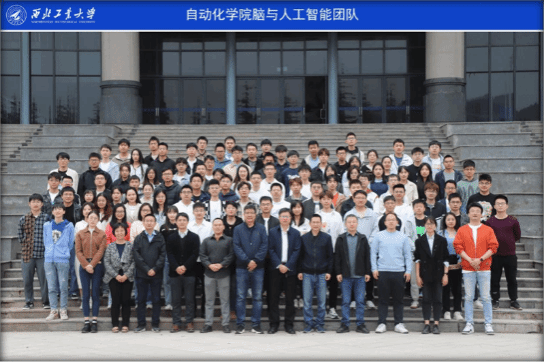
Group photo of the Brain and Artificial Intelligence Research Team of the School of Automation
Based on an international perspective, strengthen cutting-edge academic research. The team actively carries out basic research and original innovation research, committed to producing first-class original results. The team has published over 200 high-level papers in top journals and conferences in the field of artificial intelligence, including IEEE TPAMI, IEEE TIP, CVPR, ICCV, IJCAI, AAAI, etc., as well as in the Nature sub journal and PNAS, which were the first breakthroughs in our school’s control discipline. Among them, more than 40 papers were highly cited by ESI, Some papers were awarded the Most Influential Paper Award by the IEEE Earth Science and Remote Sensing Society in 2021 and 2023, the Best Paper Award in the IEEE Circuit System Video Technology Symposium in 2021, and the IEEE BIBM Best Paper Award in 2018 at international conferences. Three papers were selected as one of China’s 100 Most Influential International Academic Papers in 2018 and 2019.
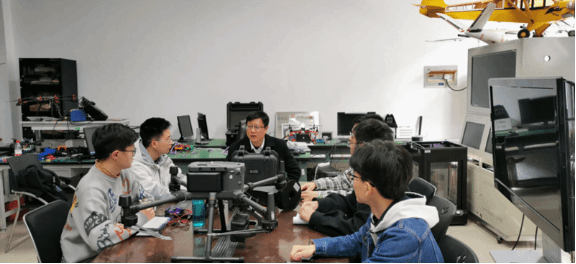
Team leader Professor Han Junwei and students are discussing
On the basis of closely focusing on the major strategic needs of the country, the Brain and Artificial Intelligence Research Team has targeted the “bottleneck” problem and continuously strengthened research on key common technologies, especially in the fields of large-scale perception system object detection, recognition, tracking, precise observation of the ground, and autonomous perception. Through independent innovation, they have obtained multiple core technologies with independent intellectual property rights, and the research results have been successfully applied in multiple important fields, significant economic and social benefits have been achieved, and representative achievements have won seven provincial-level scientific and technological awards, including the first prize of the 2018 Shaanxi Provincial Science and Technology Award and the first prize of the 2021 Wu Wenjun Artificial Intelligence Technology Invention Award.
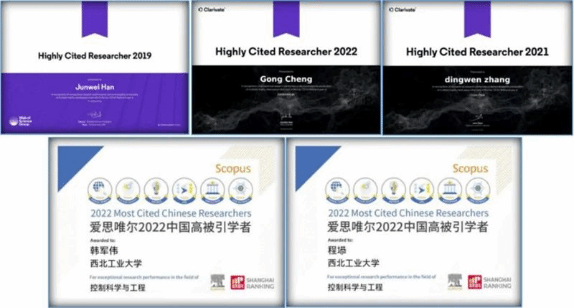
Members have been selected multiple times as “Highly Cited Scientist” by Clarivate Global and “Highly Cited Scholar” by Elsevier China
The team actively improves its construction level and creates a first-class scientific research team. At present, 2 people have been selected for the postdoctoral innovation talent support program, 1 person has won the National Hundred Excellent Doctoral Dissertation Nomination Award, 4 people have won the Shaanxi Province Excellent Doctoral Dissertation Award, 1 person has won the Academic Newcomer Award for Doctoral Students of the Ministry of Education, and 3 people have won the Excellent Doctoral Dissertation Award of the China Association of Image Graphics (a total of 10 winners nationwide each year), 1 person won the ACM CHINA SIGAI (International Computer Society China Artificial Intelligence Branch) Excellent Doctoral Dissertation Award; 2 people have been selected for the national high-level talent program, 1 person has been selected for IEEE Fellow and IAPR Fellow, 2 people have been selected for the national youth talent program, 3 people have been continuously selected for the “Highly Cited Scientist” of Clarivate Global, 2 people have been continuously selected for the “Highly Cited Scholar” of Elsevier China, and 3 people have been selected for provincial and ministerial talent programs such as the New Century Excellent Talent Program of the Ministry of Education.

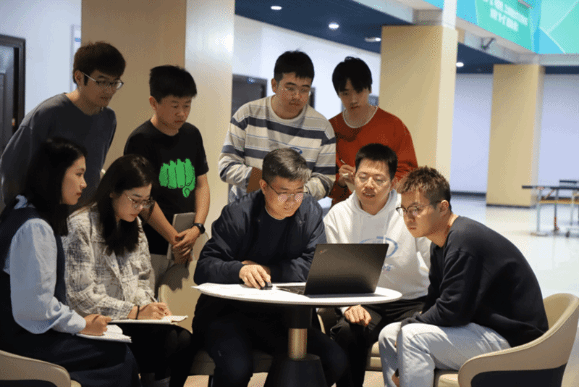
Team teachers and students carry out scientific research exchanges
In recent years, the Brain and Artificial Intelligence Research Team of the School of Automation has made multiple breakthroughs in cutting-edge basic research, especially in the fields of artificial intelligence, brain-like computing, and machine learning, and has achieved a large number of leading original achievements. At the same time, the team has maintained good cooperative relationships with multiple research institutes for a long time, serving multiple national major projects and engineering applications. By starting from the actual problems in the development, engineering development, and engineering transformation process of major projects, they discovered and refined basic scientific problems and common key technologies, and produce results, providing better basic scientific support for the high-quality development of applied research.
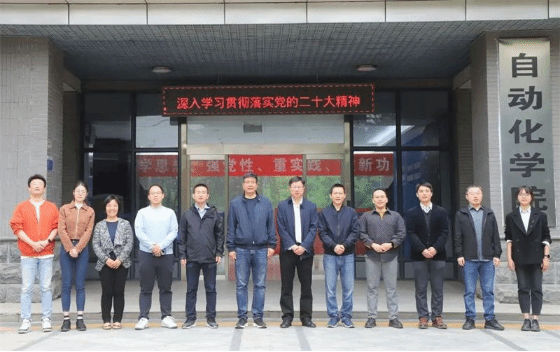
Group photo of the Brain and Artificial Intelligence Research Team at the School of Automation
This is a young research team. At present, more than 80% of the members under the age of 40 in the Brain and Artificial Intelligence Research Team, most of whom have more than one year of overseas study experience, have a broad international perspective and innovative consciousness. At the same time, the team has a relaxed innovation environment where success or failure is not based on the final outcome, providing great support and encouragement to the members. It is in such a positive atmosphere that everyone is united and sincere in cooperation, overcoming difficulties, striving hard, closely focusing on the major strategic needs of the country, and persistently exploring basic and cutting-edge academic research with a fearless scientific research spirit, contributing NPU efforts to achieve the country’s high-level technological self-reliance and self-improvement.
Source: School of Automation
Translator: Ma Le
